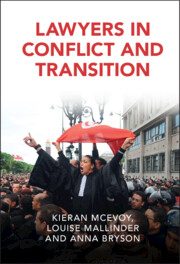Book contents
- Lawyers in Conflict and Transition
- Cambridge Studies in Law and Society
- Lawyers in Conflict and Transition
- Copyright page
- Dedication
- Epigraph
- Contents
- Acknowledgements
- Abbreviations
- Chapter 1 Lawyers in Conflict and Transition
- Chapter 2 Cause Lawyers, Political Violence, and Professionalism in Conflict
- Chapter 3 Boycott, Resistance, and the Law
- Chapter 4 Gender and Cause Lawyering in Conflicted, Authoritarian, and Transitional Societies
- Chapter 5 Government Lawyers in Conflict, Repression, and Transition
- Chapter 6 Lawyers in Transitional Political Negotiations
- Chapter 7 Lawyers, Transitional Justice, and Dealing with the Past
- Chapter 8 Conclusion
- Appendices
- Bibliography
- Index
- Cambridge Studies in Law and Society
Chapter 2 - Cause Lawyers, Political Violence, and Professionalism in Conflict
Published online by Cambridge University Press: 17 March 2022
- Lawyers in Conflict and Transition
- Cambridge Studies in Law and Society
- Lawyers in Conflict and Transition
- Copyright page
- Dedication
- Epigraph
- Contents
- Acknowledgements
- Abbreviations
- Chapter 1 Lawyers in Conflict and Transition
- Chapter 2 Cause Lawyers, Political Violence, and Professionalism in Conflict
- Chapter 3 Boycott, Resistance, and the Law
- Chapter 4 Gender and Cause Lawyering in Conflicted, Authoritarian, and Transitional Societies
- Chapter 5 Government Lawyers in Conflict, Repression, and Transition
- Chapter 6 Lawyers in Transitional Political Negotiations
- Chapter 7 Lawyers, Transitional Justice, and Dealing with the Past
- Chapter 8 Conclusion
- Appendices
- Bibliography
- Index
- Cambridge Studies in Law and Society
Summary
This chapter examines how cause lawyers in conflicted and authoritarian contexts balance their professional responsibilities with their commitment to a political cause. It seeks to add to the existing literature on lawyers and social movements by offering a new comparative exploration of the relationship between cause lawyering and violent politically motivated movements and individuals. In particular, it considers how lawyers set the boundaries of their ‘professional project’ when managing relations with politically committed clients and collective movements. Using the notion of ‘legitimation work’, this chapter examines the complex, fluid, and contingent understandings of legal professionalism that are developed in such challenging contexts. To better understand the meaning of legal professionalism in such sites, it offers three overlapping ‘ideal types’ of cause lawyers: (a) struggle lawyers, (b) human rights activists, and (c) a ‘pragmatic moral community’. The chapter concludes by re‐examining the legitimating frameworks typically employed by each ideal type of lawyer.
- Type
- Chapter
- Information
- Lawyers in Conflict and Transition , pp. 22 - 54Publisher: Cambridge University PressPrint publication year: 2022

